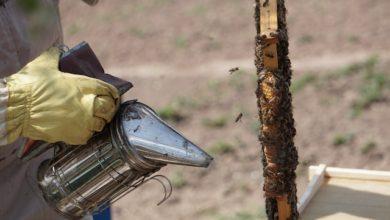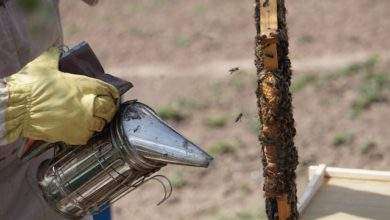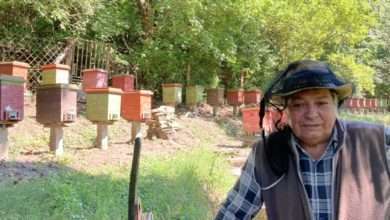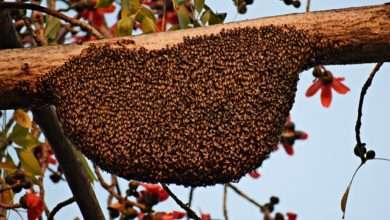Bee Pollen Benefits
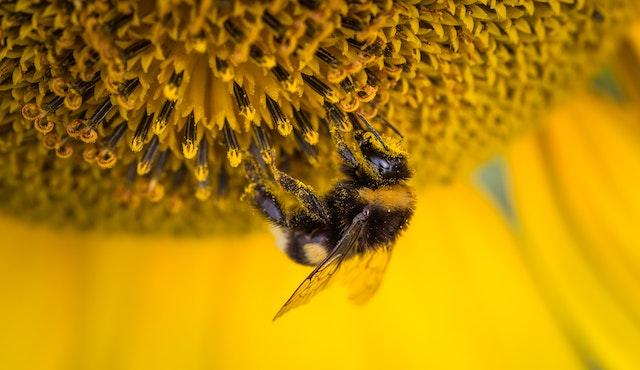
Bee pollen provides excellent all-natural allergy treatment and is the source of many of raw honey’s health advantages.
It has a wealth of nutrients, including vitamins, minerals, proteins, lipids, fatty acids, enzymes, carotenoids, and bioflavonoids, which make it an effective antibacterial, antifungal, and antiviral agent. It also strengthens capillaries, calms inflammation, boosts the immune system, and naturally lowers cholesterol levels.
In fact, bee pollen has more protein than any other animal source and more amino acids than eggs or cattle of comparable weight. And those are just a few of the many advantages of bee pollen.
What Is Bee Pollen?
Bees gather pollen from plant anthers, combine it with a little salivary gland secretion or nectar, and deposit it in special containers (referred to as corbiculae) located on the tibia of their hind legs. These containers are referred to as pollen loads.
As soon as the pollen is gathered, it is carried to the hive and stored in honeycomb cells. Then “bee bread” is made by smearing a thin layer of honey and wax over the pollen that has been collected.
According to research, anaerobic fermentation takes place to preserve the bee bread, and the lactic acid that results in keeps the bread from spoiling. As the colony of bees’ primary source of protein, bee bread is.
One to seven kilograms of pollen are produced annually by one bee colony, according to the most recent official statistics. One colony of flowers produces between 50 and 250 grams of pollen per day.
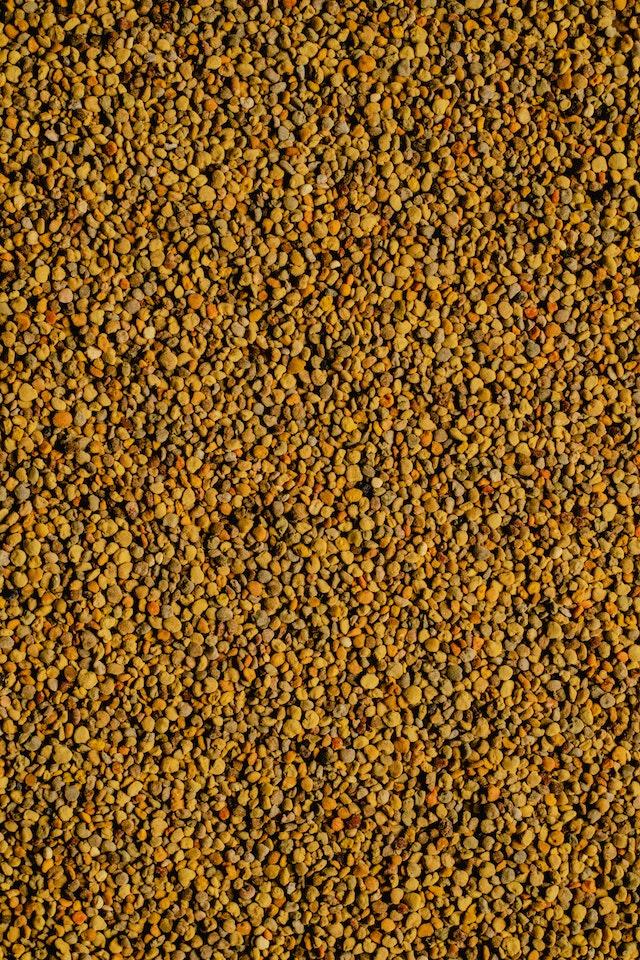
In order to capture pollen baskets as field bees return to their hives, specific tools called pollen traps are employed. In order to enter the hive, the bees must force their way past the traps, which causes them to lose some of the pollen baskets and drive them to leave the colony in search of more pollen.
Bright yellow to black are some of the colors that the pollen might be. Bees typically gather pollen from the same plant, although they occasionally gather it from a variety of other plant species. The form, color, size, and weight of pollen grains vary depending on the species of plant; they also vary in weight.
Due to the fact that bee pollen contains various chemical compounds produced by bees and used for therapeutic purposes, it is known as an apitherapeutic product. Amino acids, lipids, vitamins, macro- and micronutrients, and flavonoids are just a few of the 250 components that make up its structure.
Bee Pollen Nutrition Facts
The excellent nutrient content of bee pollen is what gives the food its advantages.
These are the nutritional statistics for bee pollen:
30 percent of the carbs are digested
Sugars at 26% (mainly fructose and glucose)
23% of it is a protein (including 10 percent of essential amino acids), 5% of it is lipids (including essential fatty acids)
2.0% of the chemicals are phenolic (including flavonoids)
Minerals make up 1.6% (including calcium, phosphorus, magnesium, sodium, potassium, iron, copper, zinc, manganese, silicon, and selenium)
Vitamins and acids that are water-soluble, such as vitamins B1, B2, and B6
Bee Pollen Benefits
Due to the variety of antioxidants, amino acids, and minerals present in bee pollen, there are a number of health benefits to eating it. It is employed for medical and therapeutic purposes all over the world.
1. Reduces Inflammation
Bee pollen’s anti-inflammatory properties have been comparable to those of medications like naproxen, analgin, phenylbutazone, and indomethacin.
According to research, it can be utilized for liver illness or toxicity, acute and chronic inflammatory disorders, initial degenerative conditions, and initial degenerative conditions.
In a study from the year 2000 that was published in the journal Pharmaceutical Biology, it was discovered that honeybee pollen significantly reduced inflammation in mice with acetaminophen-induced liver necrosis.
Another 2010 study used carrageenan-induced paw edema in a rat model to examine the anti-inflammatory effects of bee pollen bulk, its water extract, and its ethanol extract.
According to the findings, the water extract had essentially little inhibitory efficacy, while the bulk only slightly reduced the paw edema. Researchers believe that ethanol extract can be used as a dietary supplement and as a functional food because it shows strong anti-inflammatory effects.
2. Acts as an Antioxidant
A number of ailments, including cancer, heart disease, type 2 diabetes, and hypertension, can benefit from the use of enzymatic hydrolysates made from bee pollen, according to recent studies. In a 2005 study, researchers evaluated the antioxidant characteristics and discovered that it has exceptional antioxidant activity.
The level of scavenging against active oxidative stress was high, they observed. Researchers even hypothesized that pollen’s inhibitive properties were comparable to those of fermented foods, including natto, miso, cheese, and vinegar.
3. Protects Against Liver Toxicity
Chestnut bee pollen enhances the recovery of liver damage brought on by toxicity, according to a 2013 study that was published in Evidence-Based Complementary and Alternative Medicine. It also protects hepatocytes from oxidative stress.
One group of rats received two different quantities of chestnut bee pollen orally (200–400 milligrams per kilogram per day), whereas the other group received silibinin, a medicine containing flavonoids, in order to treat the rats’ liver damage caused by carbon tetrachloride.
Both therapies, according to the researchers, restored liver damage, but when given to rats, silibinin produced significant weight loss and led to their deaths from acute diarrhea. Based on these results, pollen may be a secure substitute for silibinin in the treatment of liver damage and may be used as part of a liver cleanse.
4. Boosts the Immune System
Both antiviral and antibacterial activities are present in bee pollen. The biological effects of eight different types of commercial bee pollen that were bought off the market were examined in a 2014 study that was published in Food and Chemical Toxicology.
The antimicrobial activity could be seen in all of the samples. The most susceptible to pollen was Staphylococcus aureus, and the most resilient was Candida glabrata.
The natural allergy-fighting power of bee pollen is also unknown. The impact of bee pollen on mast cell activation, which is a key factor in a number of allergy disorders, was examined in a 2008 Japanese study.
Because of its capacity to prevent mast cell activation, which is a crucial factor in both the early and late phases of allergic reactions, bee pollen does have anti-allergic action, according to in vivo and in vitro experiments conducted by the researchers.
5. Serves as a Dietary Supplement
Pollen may be a useful nutritional supplement, according to studies on animals. According to studies, the thymus, heart muscle, and skeletal muscles of mice and rats fed pollen had increased levels of vitamin C and magnesium.
After ingesting pollen, they also had a larger hemoglobin content and more red blood cells. Animals used in experiments have actually lived longer thanks to bee pollen.
According to research, giving it to kids who lack appetite or have developmental delays may be beneficial. Additionally, it might be beneficial for adults and children who are underweight, particularly before and after surgery, when recovering from alcohol addiction, or when they are experiencing physical or emotional strain.
6. Relieves Menopausal Symptoms
According to a 2015 German study, menopausal symptoms in breast cancer patients receiving antihormonal therapy were alleviated by both honey and bee pollen honey. The majority of participants who finished the study said their symptoms had improved.
Researchers propose that women who have not responded to existing options for treating postmenopausal symptoms may be given bee pollen and honey. They also point out that studies have shown that the flavonoids in honey and pollen can prevent breast cancer, encouraging the use of these products for women experiencing menopausal symptoms and issues, whether or not they have a history of breast cancer.
7. Helps Relieve Stress
Because of the nutritional value of bee pollen and its tonic qualities, it enhances blood flow to nerve tissue, enhancing mental function and bolstering the nervous system that may have been damaged by stress. As a result, it ranks among the best natural stress relievers.
It might be especially beneficial for those who lack vitality, especially the elderly. Bee pollen has been demonstrated to increase mood and physical stamina, even in tiny quantities over an extended period of time, which heightens one’s desire to live.
It also functions as a local analgesic, which enables it to lessen the pain that may be brought on by stress or injury.
8. Promotes Healing
One effective home cure for burn alleviation is bee pollen, which can be applied topically to hasten the healing process. The pollen contains kaempferol, which lessens inflammatory responses and edema after a burn by inhibiting the functioning of certain enzymes.
Pollen hydrates the skin and, according to research, helps the blood flow more freely through the veins. Bee pollen contains flavonoids that work as analgesics and anti-inflammatories to reduce pain and stop platelet aggregation. Because of its antibacterial properties, pollen also aids in the prevention of infection, hastening the recovery of burns and wounds.
Pollen can help maintain the youthful and radiant appearance of your skin because it is an excellent source of several vitamins and minerals. It increases the flow of blood to all skin cells, aids in body detoxification, minimizes the appearance of wrinkles, and hastens the healing process.
Bee Pollen for Weight Loss?
Pollen is beneficial in the prevention or recovery of malnutrition, as evidenced by studies showing that it aids in the repair of muscle protein and energy metabolism in aged rats exposed to severe dietary restriction.
However, what about losing weight? Is bee pollen a metabolism booster?
Pollen has metabolic activity and aids in hormone regulation. Its amino acid content breaks down fat cells in the body, boosting metabolism. We also know that a large number of necessary vitamins and minerals may be found in pollen, which can help people who have poor eating habits refuel their bodies.
These nutrients can be obtained in little amounts, and one ounce of bee pollen only has roughly 90 calories.
Bee pollen pills and supplements are widely available from many manufacturers, but there is little scientific proof that they actually work to speed up weight loss.
In fact, the FDA was forced to recall Zi Xiu Tang bee pollen capsules after discovering that they contained phenolphthalein and sibutramine, two weight-loss medications that are no longer prescribed in the United States due to their potential to raise the risk of heart attack or stroke.
How to Use
Purchase bee pollen from a trustworthy local beekeeper or reliable business. Make sure that neither the bee colonies nor the pollen has received any chemical treatment. Since pollen from bees is growing more and more popular, you can find it at most health food stores and farmers’ markets.
How to consume bee pollen is a topic of much confusion. It’s actually very simple to consume bee pollen. It is most frequently used when ground and combined with meals.
A mixed pollen solution that can be consumed throughout the day can be made by combining ground pollen in a 1:1 to 1:4 ratio with honey, cottage cheese, or yogurt. Take one teaspoon of mixed pollen three times each day if you’re battling an illness, vitamin shortage, allergies, inflammation, or stress.
There are also grains of bee pollen available. Yogurt, cereal, and baked items can all be made with them. When granules are combined, ground pollen is produced, which can then be added to smoothies or sprinkled on salad.
For two to three hours, you can add pollen grains or granules to warm water. As they break, the nutrients inside are released. Milk, fruit, and vegetable juices are other options for doing this. These fantastic bee pollen advantages can then be obtained by drinking the liquid or including it in a smoothie.
Risks and Side Effects
Depending on the dose, taking bee pollen orally for 30 to 60 days is generally safe for most people. A bee pollen blend can be taken in a lesser amount and is thought to be safer.
Bee pollen allergies are the main safety worries, which may be a problem for those who are sensitive to pollen. You may have bee allergies or sensitivity to bee products if you experience itching, swelling, shortness of breath, or lightheadedness after swallowing pollen, so stop using it until you’ve spoken with your doctor.
Bee pollen may stimulate the uterus, which raises concerns that it could endanger pregnancy. As a result, pregnant women should either refrain from using pollen or only use it under the supervision of a healthcare professional.
Additionally, it’s best to stay away from bee pollen if you’re taking blood thinners like warfarin.
Final Thoughts
Bee pollen has a lot of nutritional value, including vitamins, minerals, proteins, lipids, fatty acids, enzymes, carotenoids, and bioflavonoids. This nutrition content contributes to the benefits of bee pollen.
Strong capillaries, decreased inflammation, boosted immunity, and naturally lower cholesterol levels are just a few of the benefits of its potent antibacterial, antifungal, and antiviral characteristics.
Boost your natural vitamin intake by using bee pollen. According to studies, it is useful for both preventing malnutrition and reversing it once it has occurred.
Pollen and granules are available for purchase already ground. Include salads, yogurt, cereal, smoothies, and cottage cheese. Alternatively, you could let the nutrients saturate warm water before drinking it to get a boost of vitamins and minerals.
FAQ
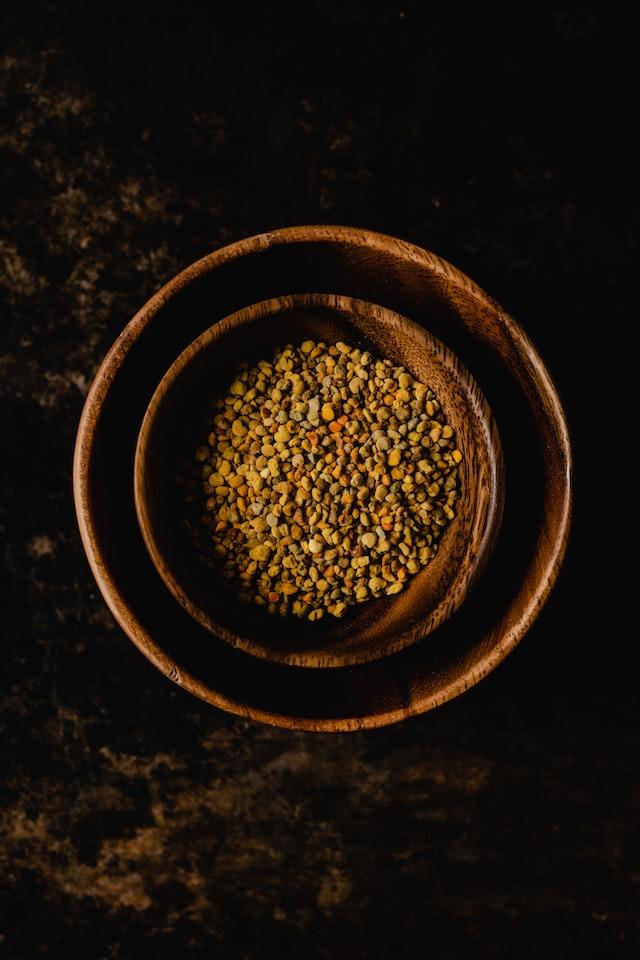
How much bee pollen should you take daily?
Proponents of alternative medicine advise beginning with a dose of 1/4 teaspoon and working your way up to 2 teaspoons every day while keeping an eye out for any negative side effects, such as itchiness, swelling, shortness of breath, dizziness, and strong whole-body reactions.
Is bee pollen a Superfood?
Bee pollen is a superfood since it is a highly bioactive tonic ingredient. This is due to the fact that it includes more than 96 different nutrients, including each and every one required for maintaining human life.
Is bee pollen anti-aging?
An anti-aging, anti-stress, and energy-boosting substance is bee pollen. Historically, anti-aging, anti-stress, and energy recipes have included bee pollen. Olympic competitors have reportedly used bee pollen to aid boost their performance, according to research studies.
Does bee pollen help the gut?
Bee pollen has also been demonstrated to promote the growth of significant probiotic bacteria in our gut, just like royal jelly does. Among the investigated species, Bifidobacterium animalis, Lactobacillus casei, and Bifidobacterium animalis spp. lactis all grew significantly better when exposed to bee pollen.
Does bee pollen help with hair growth?
One typical “side effect” of bee pollen is improved hair health and vitality. It is probably because bee pollen has a high mineral and protein content, both of which improve and encourage healthy hair.
Is bee pollen good for your brain?
Bee pollen has been shown in studies to improve blood flow to the brain. When you’re anxious, overworked, or sad, your nervous system functions are compromised. Reduced energy, bodily heaviness, and brain fog are a few signs of mental health issues that may be helped by this effect.
Can bee pollen replace a multivitamin? Almost all of the nutrients that humans need are present in bee pollen. It is primarily utilized as a dietary supplement, operating as a naturally occurring multivitamin and a highly accessible protein source.

